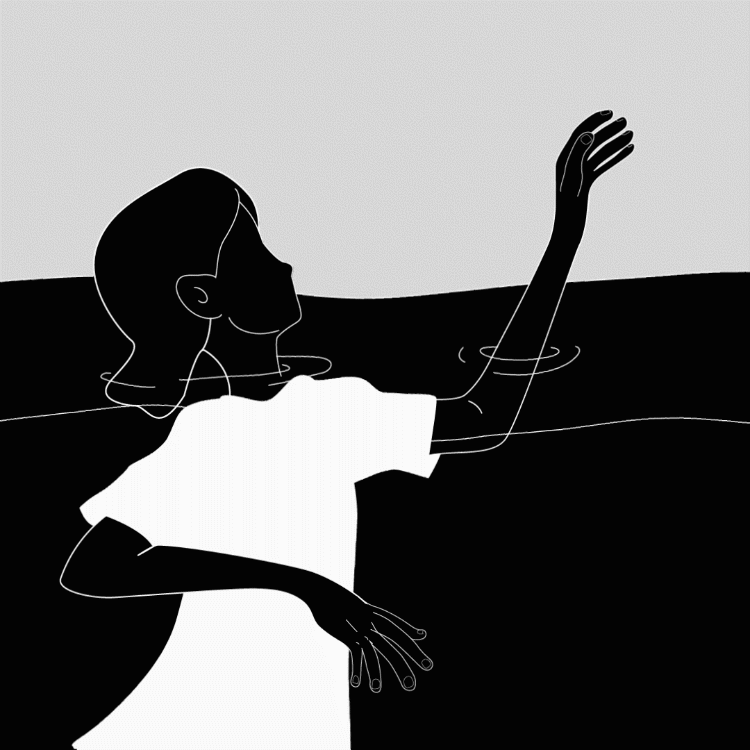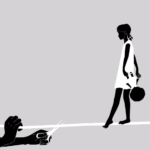SILENCE THAT HURTS
The idea that you should be ashamed if you need help is absurd. No one is ashamed to ask for help to heal a broken arm at an orthopedist. Why make others feel ashamed to seek help from a psychologist for depression?
Illustration: Argjira Kukaj

Until recently, with the word health we meant only physical health, neglecting mental health, which is just as important as physical health. Although mental problems nowadays are often the topic of discussion, there are still many people living in ignorance, constantly maintaining the stigma around mental problems. Especially, in a cultural context such as ours, where despite the great need to address mental health problems, there is still not enough discussion about it and not enough is being done to overcome the stigma surrounding mental health problems. According to the World Health Organization (WHO) there are about 450 million people worldwide with psychological adjustment. 85% of ordinary people do not have access to mental health services. Its reality and experience can also be seen in Kosovo.
So, it is painful to see that our society does not offer help to people in need, who think that feeling anxious is not a big problem, or that depression is not a condition that requires treatment. And this is how stigmas are created, and this is how words don’t spread. The words that need to be said. That people do not feel safe to express themselves. They do not feel free to seek the help they need. It is painful to see that, sometimes, this complex mind of ours can think so little and so shallow. Moreover, according to the World Health Organization, the stigma towards mental health is a major cause of discrimination and exclusion. It affects people’s self-esteem, contributes to the breakdown of their family relationships and limits their ability to socialize and get a job. So stigmatizing mental health has many detrimental effects like reluctance to seek help or treatment; lack of understanding from family, friends or others; harassment or physical violence; fewer opportunities for work, schooling or social activities. Stigma hinders the prevention of mental health disorders, the promotion of mental well-being, and the provision of effective treatment and care. It also contributes to human rights abuses.
Therefore, many people with mental health problems are left without treatment because they are silent, because once someone said to them “You are fine”, “It will be okay”. I can’t be okay on its own, we need to make it okay. Clinical psychologist Visar Sadiku says that the level of mental health awareness in our society is still unsatisfactory and that many people are reluctant to seek help as a result. According to psychologist Fikri Hajdari, why the phenomenon of silence and reluctance to talk about mental health often occurs has to do with the fact that: “People with mental illness tend to be judged more easily by others, not to be given certain privileges in society, to be labeled derogatory and offensive, insufficient social support makes them more silent to talk about their concerns.
Reluctance to seek help also differs between the sexes, where according to a study of Substance Abuse and Mental Health Service (SAMHSA), the number of men seeking treatment for mental health problems is lower than the number of women with the same difficulty.
The idea that you should be ashamed if you need help is absurd. No one is ashamed to ask for help to heal a broken arm at an orthopedist. Why make others feel ashamed to seek help from a psychologist for depression? Therefore, we must work to stop prejudices and stigmas against mental health. Mental health problems do not require prejudice or neglect, but support. It’s very easy. just stop, and understand that by bringing stigma and hatred, cannot achieve a better and safer world. We should all work to create a safe space to seek help and to speak without hesitation about mental health difficulties and problems. We should not be silent. Nor about bullying because of mental health, nor when there is no equality between people with different mental health, nor stopping to say until everyone understands that everyone has the right to a healthy life.
Note: If you need help with your mental health problems or concerns, you can contact “Linja e Jetës” the Suicide Prevention hotline by calling 0800 12345 (every day from 21:00 until 01:00).
About the author: Rudina Zeqiri, 18 years old, has finished high school.
This grant is supported by the ‘Civil Society programme for Albania and Kosovo’, financed by the Norwegian Ministry of Foreign Affairs and managed by Kosovar Civil Society Foundation (KCSF) in partnership with Partners Albania for Change and Development (PA). The content and recommendations do not represent the official position of the Norwegian Ministry of Foreign Affairs and Kosovar Civil Society Foundation (KCSF).


